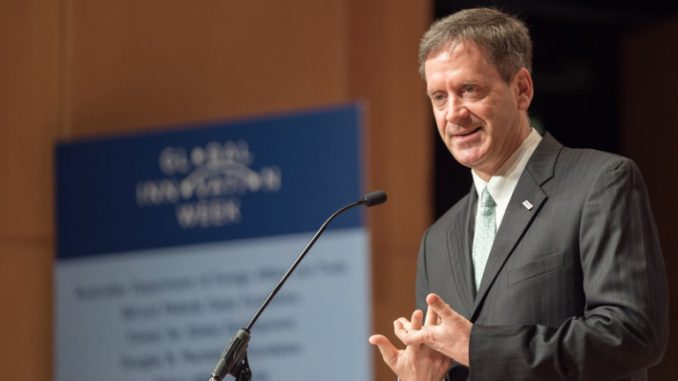
By Kelli Rogers
HYDERABAD: In early 2018, the United States Agency for International Development will issue an open call for proposals for innovative ideas to bridge the “gender digital divide,” or gender inequalities caused by barriers such as network coverage, online security, cost, and technical literacy.
The initiative is one of several announcements the agency made at the Global Entrepreneurship Summit in India’s tech capital last week, all aimed at empowering women.
Improving women’s access to technology “hits all sectors … the data and research and our empirical knowledge shows that, especially for women entrepreneurs and women’s economic development, it’s a game changer,” said Michelle Bekkering, USAID’s senior coordinator for gender equality and women’s empowerment, of the agency’s $1.5 million commitment to the challenge. “If you have a mobile phone, you can be in a village in West Bengal, but you can have access to your own money and you can do e-commerce. It opens the world to you.”
The gender data gap initiative, named WomenConnect, was launched alongside a new competition for women-led enterprises to access investment and other business services to take their food businesses to the next level, led by the U.S. Government’s global hunger and food security initiative Feed the Future.
“We want to give entrepreneurs out there the opportunity to pitch the idea and go with it,” Bekkering said.
Both new challenges align with USAID Administrator Mark Green’s overall strategy — which focuses on innovative private sector relationships, “strategic transitions” for countries to wean themselves off U.S. assistance as well as technological innovation, as reported by Devex in September — he told Devex in Hyderabad.
“What we are trying to do at USAID is tap into the strength, the innovation, and the creativity of the private sector to take on development challenges,” Green told Devex during a press conference at the summit. “We’re trying to move away from the traditional relationship, which was often a contracting relationship with the private sector, and there’s nothing wrong with contracting — we will continue to do contracting — to move to a model of true collaboration in which we work with the private sector to co-finance programs, to co-design programs, to take on challenges jointly.”
Another example of this approach is the launch of USAID’s first health impact bond, the Utkrisht Impact Bond. Through this public-private partnership, launched Thursday at the Global Entrepreneurship Summit, private capital will front the costs to improve the quality of health services in private health facilities in Rajasthan, India — and USAID will pay back the investment only if the providers achieve certain concrete results. USAID and MSD for Mothers are committing up to $8 million in outcome funding if the targets are met.
“What we want to do is to lay out a challenge that we see as a development agency: Maternal and child health, and say, you know, look, help us get to the goal of achievement in maternal and child health,” Green told Devex.
The increase in life-saving supplies and trained staff, and the improved ability to address complications in labor could save the lives of as many as 10,000 women and newborns over five years, according to USAID.
“I think the model’s a very good one because it truly harnesses the strength and creativity of the private sector, and while this is the first, I don’t believe it will be the last,” Green said.
There are “a number of innovative financing techniques” that USAID is considering adopting in many places, Green said.
It’s possible those investments will address the security and education challenges faced by women in conflict zones and crisis settings — areas USAID’S Bekkering says are receiving an increased focus within the agency.
“One of our chief concerns right now is that there are 66 million displaced people around the world,” she said. “This is a huge challenge. The administrator has looked at us and said, ‘If we don’t make sure that there are education opportunities in camps, in transit areas, we will lose whole generations of children.’ This is something that will have a strong gender focus, and I think this is something you will see us talking more about.”
Women’s economic empowerment will also continue to be a focus within the agency, as will “tech as an accelerator in all of our empowerment programs,” Bekkering told Devex.
About the Author: In her role as associate editor, Kelli Rogers helps to shape Devex content around leadership, professional growth and careers for professionals in international development, humanitarian aid and global health. As the manager of Doing Good, one of Devex’s highest-circulation publications, she is constantly on the lookout for the latest staffing changes, hiring trends and tricks for recruiting skilled local and international staff for aid projects that make a difference. Kelli has studied or worked in Spain, Costa Rica and Kenya.
Source: Devex

Leave a Reply